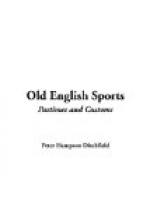Our ancestors were very careful to attend the services of the church, which their loving hands had adorned with holly, bay, rosemary, and laurel. They considered it a day of special thanksgiving and rejoicing, as an old poet observed—
“At Christmas be merry
and thankful with all,
And feast thy poor neighbours,
the great and the small.”
The solemn service of Holy Communion was celebrated on Christmas Eve, in mediaeval times—the only night in all the year when an evening celebration was allowed. The halls of the knights and barons of ancient days were thrown open to all comers, and open house was kept for a fortnight. Rejoicing at Christmas time seems to have been universal, and it is not for us to judge whether in their mirth they sometimes forgot the reason of true Christmas joy, and thought more of their feasting than of Him who was born on Christmas Day. But by their hearty manner of keeping this annual festival, by the hospitality which the farmers and rich men showed to their labourers and poorer neighbours, they promoted, at any rate, “goodwill amongst men”—old animosities, quarrels, and bitternesses were forgotten, and the hearts of the poor cheered.
In the North of England every farmer gave two feasts, one called “the old folks’ night,” and the other “the young folks’ night.” The old Squire used to receive his tenants and neighbours at daybreak, when the black-jacks were passed round, and woe betide the luckless cook who had overslept herself, and had not boiled the Hackin, or large sausage, ere the day dawned, for then she was seized by the arms and made to run round the market-place, or courtyard, until she was ashamed of her laziness.
And now let us enter the hall of some great baron and see how our ancestors kept a merry Christmas. The panelled walls, and stags’ horns, and gallery at one end of the great room were hung with holly and mistletoe. The Yule-log blazed upon the hearth, and then entered the vassals, tenants, and servants of the lord to share in the Christmas banquet. Rank and ceremony were laid aside: all were deemed equal, whether lords or barons, serfs or peasants—a custom which arose, doubtless, from the remembrance of Him who on the first Christmas Day, “although He was rich, yet for our sakes became poor.”
And now on the huge oaken table were placed the various dishes of the feast—a mighty boar’s head, decorated with laurel and rosemary, whose approach was often heralded with trumpets as the king of the feast; then came a peacock, stuffed with spices and sweet herbs, and adorned with its gay feathers, and then followed a goodly company of geese, capons, sirloins of beef, pheasants, mince-pies, and plum-porridge. A carol was often sung when the boar’s head was brought in; here is one from the collection of Wynkyn de Worde:
Caput Apri defero
Reddens laudes Domino,
The Boar’s Head in hand bring I
With garlands gay and rosemary;
I pray you all sing merrily
Qui estis in convivio.




